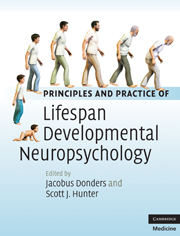Introduction
Published online by Cambridge University Press: 07 May 2010
Summary
Neuropsychology is the science and practice of evaluating and understanding brain–behavior relationships and providing recommendations for intervention that can be implemented in the daily lives of persons when brain dysfunction compromises functioning at home or school, on the job, or in the community at large. The associated target behaviors and skills can range from specific cognitive abilities to emotional and psychosocial functioning. This specialty has advanced significantly over the past several years, but recent well-respected published works about common neuropsychological disorders have tended to focus primarily or exclusively on either children or adults, or have provided separate discussions of conditions that are traditionally seen more commonly at either end of the age spectrum (e.g. Morgan and Ricker [1], Snyder et al. [2]). Similarly, there is a dearth of comprehensive discussions in the available literature to date of various neuropsychological syndromes in their different manifestations across the lifespan, and the longitudinal development and longer-term outcomes of such conditions. This has contributed to a sometimes unwarranted bifurcation within the field, where developmental course has been left out of the diagnostic and treatment equation. In response, the primary goal of this volume is to provide an integrated review of neuropsychological function and dysfunction from early childhood through adulthood and, where possible, old age, to support the understanding and consideration of the role development plays in the presentation and outcome of neuropsychological disorders across the lifespan.
- Type
- Chapter
- Information
- Publisher: Cambridge University PressPrint publication year: 2010



